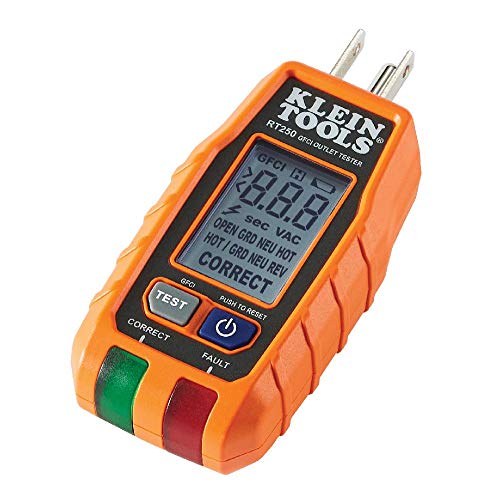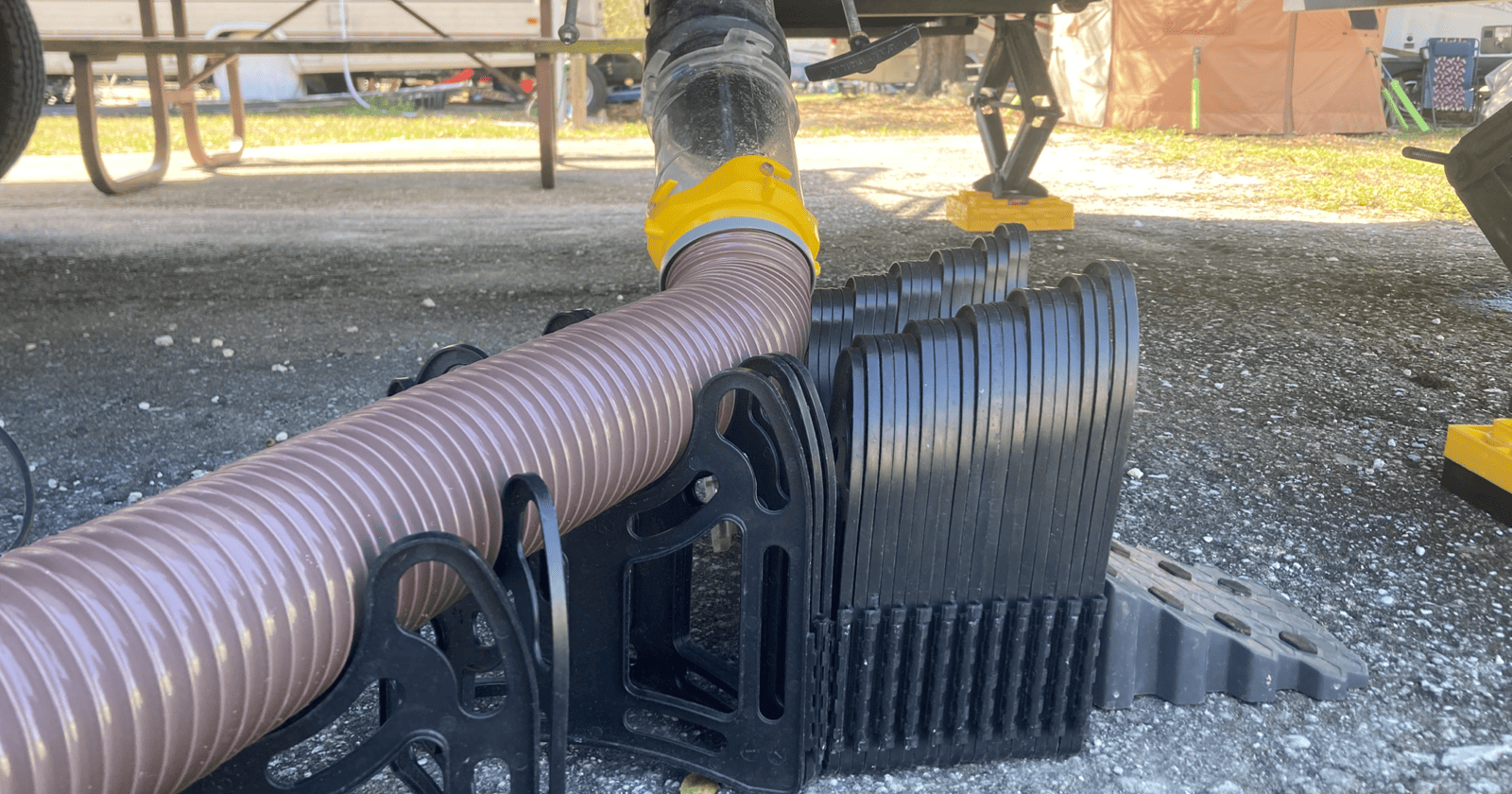Do you need to know the value of a recreational vehicle but have no idea where to begin?
I understand your frustration. With so many makes and models on the market — not to mention their own unique features — it can be downright confusing putting a fair market value on an RV. It’s essential that you don’t make a mistake in determining the value of a camper and short-change yourself!
In this guide, I hope to help alleviate the confusion surrounding motorhome and camper valuation so that you can come to an agreeable price for everyone.
Read along as I discuss the reasons you need to know the fair market value of an RV, what tools to use to determine that value, tips when negotiating a purchase or sale, pros, and cons of dealership and private sales, and how to complete an inspection before negotiating a deal.
Why It’s Important to Know RV Value

There are several reasons you will need to know the value of a camper, trailer, motorhome, or fifth-wheel like:
- When buying an RV
- When selling an RV
- Getting RV insurance coverage
These different reasons have an impact on value, which I will detail below.
- 【Food Grade Material】Made from eco-friendly PP+TPR material...
- 【Built-in Utensil Drying Rack】Separate storage area for...
- 【Compact and Portable】The collapsible dish drainer is simply...
- 【Drying Water Quickly】The collapsible dish storage rack...
- 【Easy to Maintain】Heavy-duty plastic is simple to wipe clean,...
#1 – Buying/Selling: Putting a Price on a New or Used RV
There are different ways to come to a price you feel comfortable paying when purchasing an RV, or a price you feel is fair when selling your camper.
Going into an RV superstore and paying sticker price is just as silly as paying the full asking price from a private seller when their RV has issues. But if you don’t have a ballpark figure of the actual value of the recreational vehicle you wish to purchase, you can easily overpay even if they offer you a number lower than the asking price.
#2 – Insurance Coverage
Once you own an RV, you’ll need to put insurance coverage on it. You will need to have a value for replacement if stolen or to cover damages from an accident.
Most people use the purchase price for value, but if you inherit a camper or got an excellent deal, you may need to prove a higher value so you can protect your investment in the RV.
If you use your camper sporadically, you can add it onto your auto insurance policy with few issues. If you’re making plans to live full-time in your RV, insurance can become problematic if you have no other vehicle, like I found when I began my RVing life.
When you full-time RV you rely on your camper to get you where you’re going. You need comprehensive coverage on your recreational vehicle to deal with possible towing, repairs, hotel stays, car rentals, or even full replacement.
Several companies offer full-time RV insurance coverage, so you can feel confident traveling about the country. Problems arise when you have an old model RV, or you made extensive renovations that affect value.
I had a trifecta of issues when shopping for insurance for my 1984 Class C motorhome. I had no tow vehicle, it was old, and it had a complete renovation. They would only insure my RV for the value of the motorhome when it was in its original state.
To combat this, I had to continue paying for insurance on an invisible car I had in “storage” to the tune of $7 a month. I also had to pay for an independent RV appraisal to present to my insurance company to determine the value of coverage considering the renovations made to the camper.
The appraisal was a little pricey at $220, but at least I know if something happens to my RV, I won’t be out in the cold and can recoup some of the money I put into the renovations and upgrades.
The nicer and newer your camper, the more insurance coverage you will need, so having a proper value put on your RV is vital.
Finding Fair Market Value for an RV
There are several ways to determine the fair market value of a recreational vehicle:
- Using RV price guides found in bookstores or online
- Search online for comparable sales/selling prices
- Professional appraisal
Using one or more of these methods is the best way to come to a good value. The more data you have makes it easier to average out to form a realistic value.
#1 – RV Price Guides

Price guides are the first place people look when trying to put a value on a recreational vehicle. While these books provide a price range for a particular model of a camper, many of them, like the NADA Guides, base their valuation on a depreciation estimate from a new RV’s MSRP.
Since this information does not reflect actual sales prices, these numbers can be way off. As a general rule, use the “low estimate” value when pricing a particular RV. If you’re looking to buy or sell, this guide gives you the ability to input all the pertinent information about your camper, like features, mileage, age, etc. that determine value.
The NADA guide book shows pricing for truck campers, travel trailers, fifth wheels, and motorhomes for the past 15 years.
I found several other sources for RV valuations while searching online. Some places like PPL add to their information on RV values by also using actual sales prices.
Combining information from many sources will bolster your confidence in coming to a final RV value.
As you’ll see when perusing such a guide, depreciation is higher within the first few years of purchase. Expect a new RV to lose close to 30 percent in value as soon as it’s driven off the lot.
At around six years of age, an RV is worth about half of what it was when new. Depreciation will taper off as a camper gets older until it flat-lines at the “scrap value” of the RV.
Some vintage campers will show an increase in value if they are in great condition, as you will see in Airstream trailers.
Kelley Blue Book at one time put out an RV value guide, but no longer does. You may find an old copy of the KBB RV value guide, but this information will be out of date.
- Lynx Recreational Vehicle Leveling Kit, 10/Pack
- Modular designed levelers not only configure to fit any leveling...
- To use: simply set them into a pyramid shape to the desired...
- The levelers can also be used as a support base for other...
#2 – Online Sales Information
You can find actual sale prices for campers and motorhomes by searching sites such as eBay and filter it to “sold” listings. Doing this can help you price a camper similar to one that interests you, see if any sold recently, and what area in the country it was sold.
This type of information will provide a current value of what people are willing to pay for a camper. Location does play a part in the price. An area with high demand and few RVs available will most likely get a higher selling price.
You can also see sold listings from RV dealerships or online sale sites that may include the final sales price.
Looking through a website like RV Trader, or from a major RV dealership, is another helpful way to see what people are asking for a similar model of recreational vehicle.
These RV websites are beneficial because they tend to show things like mileage, amenities, and upgrades that affect value. Compare your RV to what you see for sale to help you estimate the value of your RV.
#3 – Professional RV Appraisals
Another option when putting a price to an RV is to pay a professional to appraise the unit. The fees for such a service can run from about $200 to very expensive.
A local RV mechanic or dealership may offer an RV appraisal service in which they travel a short distance to inspect the camper, or you bring the RV to their shop. They will then base the value on the camper’s condition and the latest regional sales data.
A professional RV appraisal company like RV Appraisals and Investigations of America may have to send an agent via plane to inspect the RV and will require detailed photos of all interior and exterior components, which will increase the fee greatly. The agent will compile the information about the RV and compare it to national sales data to determine a value.
The benefit of going with a mechanic or a professional appraiser is they have no bias (as you would find with a buyer or seller) when reaching a value. They’ll base their information on all the basic facts about the RV, plus recent sales information.
This type of appraisal is best for high-end RVs and motorhomes so you buy or sell at a fair price or to ensure you have enough insurance coverage.
Factors That Affect Value
Of course, an RV that follows a maintenance routine will have more value than one that an owner neglects. These are the factors that bring more value:
- Newer make/model age
- Low mileage
- Engine, undercarriage and tire condition
- Exterior paint finish
- Interior configuration
- Upgrades (tankless water heater, satellite TV, solar panels, levelers, backup cameras, etc.)
- Size-Bigger is better
Just as when you buy a car or home, overall RV condition and amenities play a considerable part in its value. But unlike a car or house, an RV can be much harder to market because there are fewer people who desire them, and there are thousands available at any given time.
In this next section, I’ll go over what to look for when buying from a dealer or through a private seller and the pros and cons of each.
Buying from an RV Dealer
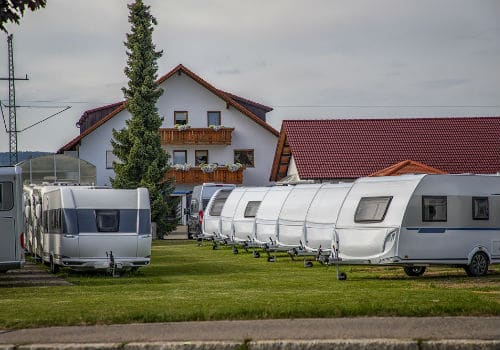
You are in the market for a new or used recreational vehicle and decide to check out local RV dealerships or look online to peruse inventory and get an idea of the dealer‘s asking price for different types of campers.
I suggest you never purchase an RV sight unseen, so if you do find a camper that interests you online, make a trip to see it. What looks impressive in pictures won’t be so lovely when you take it on your first outing, and you realize the roof leaks or the electrical system is suspect.
A scenario like this is why making a trip to an RV dealership is a smart first step. You can not only make a thorough inspection of a camper you like, but it also gives you an opportunity to see different makes and models of RVs in one trip and understand how the dealer puts a value on the RVs.
Most dealers have all the new models of RVs, plus a wide selection of campers that came in as trade-ins and they need to sell.
Don’t be in a rush. Make your first journey to a dealership to just browse. Write down as much information as you can about the RVs that interest you, then go home and do more research to determine a more accurate value on each one.
When you know what others have paid for a similar camper, and any complaints or issues owners of that make and model experience, you’ll be in a better position when it comes time to start purchase negotiations.
Try not to waste a salesperson’s time, but do get as much information as you can on your initial visit.
The pros of RV dealerships:
- Wide selection of new and used inventory
- Financing options
- May take your old camper as a trade-in
- Warranties
- Knowledgeable salespeople
- They may deliver if you don’t have a tow vehicle
- Many have a service department
The cons of RV dealerships:
- High mark-ups
- Service department may be busy (long time for repairs)
- Tricky sales tactics
If you feel comfortable having a warranty with a company who will stand behind your purchase, buying from a RV dealer is the way to go.
- 6-Step Water Filtration System: Filter hose washer,...
- Superior Filtration Standard: Boost your water's purity with...
- Versatile and Essential: An indispensable tool for camping and a...
- Top Industry Certifications: Our water filter system surpasses...
- Proud American Quality: Made in the USA, our RV water filters...
But, don’t expect to have any service or repairs on your camper to be dealt with quickly. RV dealerships with service centers tend to be extremely busy. Many can’t keep every different RV part in stock so they’ll have to send off for them, which could take weeks.
As a full-time RVer, I’ve seen many a camper held hostage by a slow service center. Having to pay extra for a hotel room, because you live in your RV, is not only expensive but stressful. All of your belongings are in your camper, so when it’s in the hands of someone else for any length of time, you feel sick to your stomach.
Hopefully, the recreational vehicle you purchase from a dealership has been through an inspection by a qualified RV technician, and you’ll only have to bring in your RV for routine maintenance.
Negotiating a Fair Price from the Dealership
Some people love to negotiate price when working with a dealership, but most of us don’t because we feel we’re at a disadvantage.
This feeling is true since a customer has no way of knowing what a dealer has paid for the camper you want, especially if that camper was a trade-in.
Using these next steps is the way you can be in the best position possible when you start price negotiations when buying from an RV dealership.
#1 – Fair Market Values
Have current numbers on hand of the fair market value of the RV you wish to purchase, plus that of any trade-in you may be putting toward the sale.
If you haven’t done your homework, most dealer sticker prices include around a 30 percent markup on average. This isn’t always true, some can be more or less, but if you’re caught off-guard, this is a good baseline to determine what a dealer’s potential profit may be.
This method could cost you thousands of dollars since other factors determine value, but in a pinch, it’s better than nothing.
#2 – Avoiding Sneaky Sales Tactics
Get the bottom line on price before you start trade-in negotiations.
Dealerships tend to overvalue your trade-in to distract you from the actual price you are paying for your new camper.
You may think that $85,000 fifth-wheel is a great deal when the dealership values your trade-in at $25,000, leaving you with a $60,000 balance.
You may be so excited to bring your new RV home that you overlook that you could have been able to negotiate that RV price down $20,000 before you even mention you have a trade-in to put toward the purchase price.
When you know your trade-in’s value, you now have the power to either accept a reasonable offer from the dealership or choose to sell it yourself.
A salesperson will also hype your low monthly payment if you are financing the RV. They want you to feel your purchase is affordable, but won’t elaborate on the fact that those payments may run 84 months or more.
Extended financing is common when purchasing a new RV, not like the three or five year loans standard for automobiles.
#3 – Time Your Purchase to the Off-Season
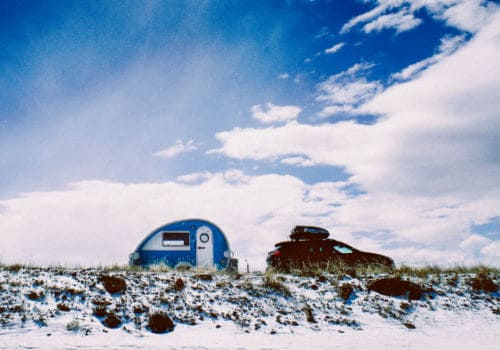
If possible, purchase your RV in the slow season for camping. Dealers are more willing to offload older model campers at a lower price.
Late summer and the middle of winter are great times to look for a camper. The excitement of campers getting ready for summer RV trips, and seasonal campers looking to upgrade before they head south for the winter make spring, early summer, and fall busy times for RV dealerships.
Buying from a Private Seller
I believe you can get the best deals when buying from a private seller.
Why?
A private seller has more motivation to make a deal for a variety of reasons. They may want to avoid paying for another season of storage fees. They may want the money to upgrade to a newer camper, or they may want it out of their driveway or yard.
The pros of going through a private seller:
- No large dealership markups
- Quick
- Easier to inspect
- Better information about the unit-sometimes!
The cons of private sellers:
- No recourse for problems/sold as is
- Seller may lie about issues
- Cash deal
The beauty of going through a private seller when purchasing an RV is that most will be honest about any recurring issues they would encounter during their trips, and give you tips on how to deal with it.
All RVs have issues or quirks, so consider it a red flag when a seller insists there is nothing wrong with the unit. Most quirks are not going to be a deal-breaker, but they may give you more room to negotiate for a better price.
Another great reason to go through a private seller is having more time to fully inspect the camper, using the guidelines I talk about in the next section.
If you and the seller agree on terms, you can expect to hand over cash to complete the transaction. If there is no written contract dealing with possible issues that may happen shortly after sale, expect the sale to be “as is” with all responsibility for service and repairs to fall only on you.
Not all sellers will be truthful about damage like a water leak, or they may not even be aware there is one if it’s in a hidden area, so it’s up to you to get an inspection.
Private Seller Negotiations
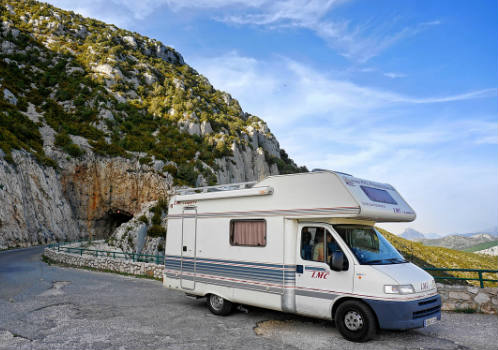
When you come into the sale knowing the fair value for the RV you are looking at, it makes it easy to negotiate a lower price without insulting the seller and killing the deal.
It’s possible that the seller has no idea of the true value of their camper, and they have it so undervalued that you can feel good paying the full asking price.
The time of year will affect the value of the RV during private seller negotiations, just as it will for a dealership. Offer less if camping season is over, because now you will be taking on the burden of off-season storage.
Offer less when you find areas that will need immediate repair, or the tires are at the end of their life. Don’t expect a seller to drop the price just because you dislike the pattern on the curtains.
RV Inspection Tips
The last helpful way to understand the value of an RV is to perform an inspection. You can hire someone to do this, do it yourself, or look at the list an RV dealership should provide for each camper they sell.
You can print out this handy inspection checklist to use when looking over any camper when trying to determine value. This checklist is a fantastic tool for general maintenance once you own an RV so you don’t miss anything.
It’s a great idea to carry a small flashlight, moisture meter, and electrical receptacle tester when inspecting an RV. These tools can quickly let you see into the dark corners in cabinets and under seats to check for water leak damage, test areas for moisture, and verify the electric plugs have the correct polarity.
- CLEAR LCD READOUT: GFCI Receptacle Tester features a large...
- TRIP TIME DISPLAY: LCD readout shows the time required to trip a...
- DETECT COMMON WIRING FAULTS: Detect and identify common wiring...
- PATENT-PENDING OPEN NEUTRAL & OPEN GROUND DETECTION: Innovative...
- CONVENIENT AUTO-HOLD FEATURE: Auto-Hold function holds the...
While most people look
Final Thoughts on Knowing the Value of an RV
After reading this article, you can see how important it is to know the value of an RV so you can negotiate a good price when buying or selling. It’s also critical to know your camper value in order to have the right amount of insurance coverage, in case of an accident.
I hope this guide gives you the tools you need to determine the value of a travel trailer, motorhome, pop-up, fifth wheel, or any other type of camper, so you can make better decisions when dealing with RV concerns. Check out the below informative video for more on how to use the NADA guides and other tips on RV value.
What’s the best way you have found to add value to your RV? Share your secrets with the camping community, we would love to hear it!
Product data was last updated on 2024-04-24 at 21:11.




